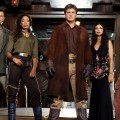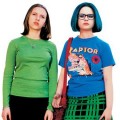I’ve seen a number of recent articles discussing Westworld, asking whether or not it can ‘do for science fiction what Game of Thrones did for fantasy’. The idea being that Game of Thrones brought the fantasy genre into the mainstream by focusing less on traditional fantasy elements. But is this really something we want to encourage?
I love Game of Thrones but the idea that we need to ‘water down’ the genre elements in order to make a story more appealing to the masses is patronising both to ‘the masses’ and the already established genre fans. Let’s face it, while GoT might be a great series, full of interesting political machinations, it has very few fantasy elements to it – and the first of them, the dragons, didn’t even appear until the very end of season 1.
 Is the GoT legacy one that genre fans should celebrate? Grim medieval political drama with a bit of fantasy thrown in… is this not moving away from traditional genre fiction to the crossover fiction that has been doing the rounds for the last few years – real world drama with a bit of the fantastical thrown in, the next The Time Traveler’s Wife? Why should we be celebrating these crossover stories any more than we celebrate great genre content?
Is the GoT legacy one that genre fans should celebrate? Grim medieval political drama with a bit of fantasy thrown in… is this not moving away from traditional genre fiction to the crossover fiction that has been doing the rounds for the last few years – real world drama with a bit of the fantastical thrown in, the next The Time Traveler’s Wife? Why should we be celebrating these crossover stories any more than we celebrate great genre content?
Perhaps we could argue that the slow move from historical drama into fantasy was a way of hooking viewers who would not ordinarily try a straight fantasy series. It might be a softer entry into the fantasy genre, proving to skeptics that fantasy isn’t all elves and dwarves in silly costumes and bulbous prosthetic noses (if we’re talking TV/film), but why do we feel the need to de-genre our tropes in order to win more fans? Is this born out of the general opinion that genres like science fiction, fantasy, and horror are somehow less worthy than realist genres? Why are we so concerned with watering down SFF for those who have belittled and made fun of it?
 Whether or not you think the Game of Thrones legacy is one to applaud, I would argue that Westworld is not conducting itself in a similar way. It may well appeal to the masses (with a gross viewership to date of almost 12 million, so far outperforming the first season of GoT), but it certainly hasn’t gone soft on the science fiction elements of the series. The premise is undeniably scifi from the off, from the robots’ hardware to the sophisticated AI’s they run on. Westworld immediately delves into questions of AI consciousness, how we interact with and rely on technology, and the ethics of our treatment of such beings. While WIRED argues that this goes further than most science fiction, I would argue that this is exactly what science fiction should do – and what much of it does.
Whether or not you think the Game of Thrones legacy is one to applaud, I would argue that Westworld is not conducting itself in a similar way. It may well appeal to the masses (with a gross viewership to date of almost 12 million, so far outperforming the first season of GoT), but it certainly hasn’t gone soft on the science fiction elements of the series. The premise is undeniably scifi from the off, from the robots’ hardware to the sophisticated AI’s they run on. Westworld immediately delves into questions of AI consciousness, how we interact with and rely on technology, and the ethics of our treatment of such beings. While WIRED argues that this goes further than most science fiction, I would argue that this is exactly what science fiction should do – and what much of it does.
If anything, the series is strongest when it features the behind-the-scenes workings of the park, where all the most ‘scifi’ action is taking place. The ongoing activities of the hosts and guests within the park itself are also at their best when things go wrong; when the hosts are going further off-script, malfunctioning, and questioning their own existence. Where GoT relied on its pseudo-historical setting to provide the hooks, Westworld embraces its science fiction roots. There’s no shyness here about this being a genre show, it wears its classic SF tropes on its sleeve and is proud to do so.
 I don’t believe that Westworld is doing for science fiction what Game of Thrones did for fantasy – I think it is doing something much better. Westworld’s success is proving that there is a large market out there for well-made, thought-provoking science fiction without any watering down of the genre elements.
I don’t believe that Westworld is doing for science fiction what Game of Thrones did for fantasy – I think it is doing something much better. Westworld’s success is proving that there is a large market out there for well-made, thought-provoking science fiction without any watering down of the genre elements.
Westworld has been picked up for a second season, but unfortunately, it looks like viewers will have to wait until 2018 for the next installment. At least we have the next season of Game of Thrones between now and then.
 Pop Verse Pop Culture Universe
Pop Verse Pop Culture Universe






